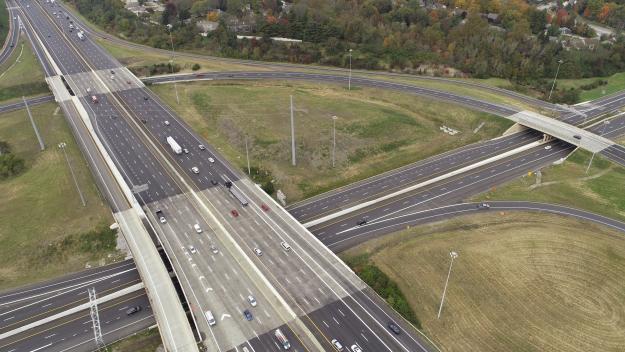2009 News Archive
Flexible Pavements of Ohio (FPO) maintains a comprehensive electronic library of relevant industry news. Select the following for current and archived news, information regarding FPO’s awards program, or to contact a member of our staff.

By Darren Caywood
•
20 Sep, 2019
For Immediate Release: December 1, 2009 Andrew Gall joins the Flexible Pavements of Ohio staff on December 14, 2009 as Director of Customer Relations Joining the Flexible Pavements of Ohio (FPO) staff as Director of Customer Relations on December 14, much of Andrew Gall’s responsibilities will involve advocacy and outreach efforts to industry customers, federal and state policy makers, affiliated trade associations and the construction industry at large. “Andrew’s institutional knowledge of the industry and our customer base will prove a great asset to the association and its mission of promoting the use of asphalt pavement,” FPO’s President and Executive Director Cliff Ursich said. “He will be a valued addition to the FPO team.” Gall brings to the position both public- and private-sector experience. He spent more than 12 years working for the Ohio Department of Transportation (ODOT) in various capacities on the department’s senior staff, most recently as the departmental chief of staff. In addition to his public service, Gall has held positions with two civil engineering firms in Ohio, where he was responsible for a variety of corporate administrative, marketing and business development tasks. As ODOT chief of staff, he was responsible for policy development and implementation, statewide media and public relations as well as working with members of the legislature and other state agencies. He managed the ODOT’s State Infrastructure Bank, which provided more than $300 million in construction loans dedicated to local transportation infrastructure. He served as the agency liaison on cabinet level committees, including Gov. Bob Taft’s Jobs Cabinet, the Bicentennial Commission and the State of Ohio Security Task Force. In 2003, he received a gubernatorial appointment to the State Highway, Bridge and Overpass Vandal Fence Task Force. Most recently, Gall served as the regional director of Business Development for a civil engineering firm, Quality Control Inspection Inc. He was responsible for the development and implementation of a regional marketing program as well as serving as a corporate resource on the administrative procedures of state and federal construction programs. “I believe my experience in the transportation industry combined with my public sector service will allow me to advance the mission of FPO in promoting the use of asphalt pavement.” Gall said. “I look forward to getting to work.” Representing the interests of the FPO membership to the construction industry, asphalt consumers and state and local government will be Gall’s primary focus. He will be tasked with conveying FPO’s message and fostering an industry friendly regulatory environment while working to ensuring a stable, adequately funded roadway construction program in the state of Ohio. “I am excited to represent our membership and continue the work of the association in creating a culture where asphalt pavement is the first choice in roadway construction and maintenance.” Gall said. Gall, his wife and twin sons reside in Columbus. He is a graduate of The Ohio State University and a veteran of the United States Marine Corps.

By Darren Caywood
•
20 Sep, 2019
For Immediate Release: November 1, 2009 The Asphalt Pavement Alliance (APA) has released a statement on the continuing economy of asphalt pavement construction. APA REFUTES CLAIMS FROM CONCRETE INDUSTRY ON COSTS OF PAVING PROJECTS Lanham, MD – The Asphalt Pavement Alliance (APA) today refuted claims by the concrete industry that the cost of asphalt pavements has risen to match the cost of concrete. Speaking on behalf of the National Asphalt Pavement Association, asphalt producer/contractor Larry Lemon said, “Asphalt pavement is the buy of the year. There are a couple of reasons for this. For one, with the economy causing a slowdown in construction activity, competition is fierce. Also, the price of asphalt cement is lower than it was last year. What it adds up to is that owners and roadbuilding agencies are getting a great price.” Lemon is the Chairmanelect of NAPA’s Board of Directors and is slated to take office in January. He is Chairman of Haskell Lemon Construction Co. in Oklahoma. Concurring with Lemon was Asphalt Institute President Pete Grass, P.E. In a recent address at the International Conference on Perpetual Pavements, Grass said, “I’m bullish on asphalt.” He reported on research showing that the U.S. demand for asphalt is the lowest in nearly 30 years. “There has never been a better time for an agency/owner to invest in their infrastructure project by any means available,” he commented. Examples from around the country illustrate the costeffectiveness of asphalt pavements:

By Darren Caywood
•
20 Sep, 2019
For Immediate Release: April 1, 2009 Sometimes, even when you win, you lose. Because of the volatility of the construction materials market, the Ohio Department of Transportation, ODOT, chose to experiment with alternate bids for pavement type on some major projects. On these projects, contractors were required to submit bids for both the asphalt and concrete pavement alternative designs. This is different than in the past, when ODOT sometimes solicited “optional” bids; that is, contractors could submit a bid for either the asphalt or concrete at their option. These projects also did not include ODOT’s customary asphalt price adjustment provision. One of these alternate bid contracts was the Lake County, SR 2 – 3.32 project bid January 28, 2009. The bidding results on this project were the subject of an article in the Cleveland Plain Dealer on April 25, 2009 that was widely noted by national news services. On the Lake SR 2 project the low asphalt pavement bid was $27, 018,532.14. The low concrete pavement bid was $27, 449,512.39. These amounts include all the bid items of work that differed because of the pavement type and are based on an analysis of all of the bids received for the project. But, even though there was an asphalt pavement bid that was $430,000 less, the project was awarded to the contractor with the concrete alternate; because his total project bid was lower overall. Even with the alternate bid items, ODOT is still obligated to take the lowest total project bid. In other words, the successful bidder was determined by lower prices for work other than the pavement. So, even with the recent volatility in petroleum and asphalt commodity prices, asphalt pavement remains an economical choice. When you consider the long life and low cost of maintenance of a deep asphalt base pavement, the choice looks even better.
Office Address
6205 Emerald Parkway
Suite BDublin, OH 43016
Suite B
Additional Contact
Fx: 614-791-4800Toll Free: 1-888-4HOTMIX
(1-888-446-8649)
(1-888-446-8649)
